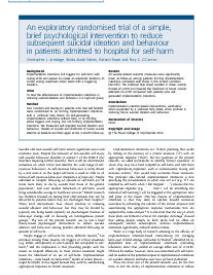An exploratory randomised trial of a simple, brief psychological intervention to reduce subsequent suicidal ideation and behaviour in patients admitted to hospital for self-harm.
BACKGROUND:
Implementation intentions link triggers for self-harm with coping skills and appear to create an automatic tendency to invoke coping responses when faced with a triggering situation.
AIMS:
To test the effectiveness of implementation intentions in reducing suicidal ideation and behaviour in a high-risk group.
METHOD:
Two hundred and twenty-six patients who had self-harmed were randomised to: (a) forming implementation intentions with a 'volitional help sheet'; (b) self-generating implementation intentions without help; or (c) thinking about triggers and coping, but not forming implementation intentions. We measured self-reported suicidal ideation and behaviour, threats of suicide and likelihood of future suicide attempt at baseline and then again at the 3-month follow-up.
RESULTS:
All suicide-related outcome measures were significantly lower at follow-up among patients forming implementation intentions compared with those in the control condition (ds>0.35). The volitional help sheet resulted in fewer suicide threats (d = 0.59) and lowered the likelihood of future suicide attempts (d = 0.29) compared with patients who self-generated implementation intentions.
CONCLUSIONS:
Implementation intention-based interventions, particularly when supported by a volitional help sheet, show promise in reducing future suicidal ideation and behaviour.
Geachte bezoeker,
De informatie die u nu opvraagt, kan door psychotraumanet niet aan u worden getoond. Dit kan verschillende redenen hebben,
waarvan (bescherming van het) auteursrecht de meeste voorkomende is. Wanneer het mogelijk is om u door te verwijzen naar de bron
van deze informatie, dan ziet u hier onder een link naar die plek.
Als er geen link staat, kunt u contact opnemen met de bibliotheek,
die u verder op weg kan helpen.
Met vriendelijke groet,
Het psychotraumanet-team.
In: The British journal of psychiatry, ISSN 0007-1250 | 208 | 5 | May | 470-476
http://doi.org/10.1192/bjp.bp.114.162495


